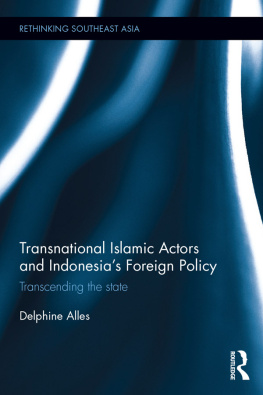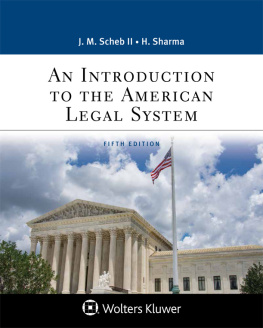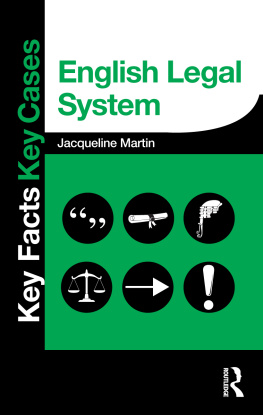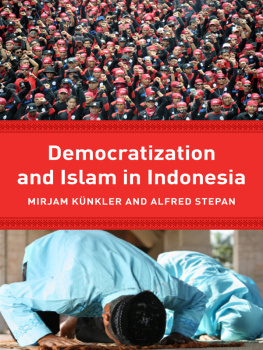INDONESIAN LAW

Great Clarendon Street, Oxford, OX2 6DP, United Kingdom
Oxford University Press is a department of the University of Oxford.
It furthers the Universitys objective of excellence in research, scholarship, and education by publishing worldwide. Oxford is a registered trade mark of Oxford University Press in the UK and in certain other countries
Simon Butt and Tim Lindsey 2018
The moral rights of the authors have been asserted
First Edition published in 2018
Impression: 1
All rights reserved. No part of this publication may be reproduced, stored in a retrieval system, or transmitted, in any form or by any means, without the prior permission in writing of Oxford University Press, or as expressly permitted by law, by licence or under terms agreed with the appropriate reprographics rights organization. Enquiries concerning reproduction outside the scope of the above should be sent to the Rights Department, Oxford University Press, at the address above
You must not circulate this work in any other form and you must impose this same condition on any acquirer
Crown copyright material is reproduced under Class Licence Number C01P0000148 with the permission of OPSI and the Queens Printer for Scotland
Published in the United States of America by Oxford University Press
198 Madison Avenue, New York, NY 10016, United States of America
British Library Cataloguing in Publication Data
Data available
Library of Congress Control Number: 2018942414
ISBN 9780199677740
eISBN 9780191665578
Links to third party websites are provided by Oxford in good faith and for information only. Oxford disclaims any responsibility for the materials contained in any third party website referenced in this work.
For the Professors Hooker, Virginia, and Barry, who inspired this BFB
Acknowledgements
We wrote this book because it is what we both needed when we first started researching Indonesian law, but could not find. It is a compendium of laws with commentary that ranges from the technical-legal to the socio-political that is intended to explain how law operates in practice in Indonesia. We hope the book will be useful to scholars and practitioners, and that it will inspire more work on Indonesias complex legal system by future generations of lawyers.
Writing this book has taken many years, and we are grateful to the Indonesian lawyers and scholars who have generously allowed us to interrogate them, including Professor Jimly Asshiddiqie, Professor Todung Mulya Lubis, Professor Denny Indrayana, Professor Bagir Manan, Professor Jamhari Makruf, Dr Nadirsyah Hosen, and the late Professor Adnan Buyung Nasution.
We dedicate this book to Professors MB Hooker and Virginia Hooker, who have greatly guided our thinking on Indonesia and law, and have mentored both of us at various stages of our careers. They have always been tremendously encouraging and supportive of our work. Simon in particular owes a significant debt of gratitude to them: at the Australian National University, Virginia first taught him Indonesian language, and Barry supervised two medal-winning theses. Tim also wishes to acknowledge the contribution of Professor Charles Coppell to his understanding of Indonesia.
Special thanks must go to Tim Mann, Associate Director of the Centre for Indonesian Law, Islam and Society (CILIS) at the University of Melbourne and editor of the Indonesia at Melbourne blog. A talented researcher and writer, Tim played a central role in the research for this book, and it would not have been completed without him. Thorough and reliable, it has been a great pleasure to work with Tim. Any errors are undoubtedly ours!
Sarah Rennie, an Associate of CILIS and now a solicitor, also played a vital part in the research that led to this book, conducting extensive and original research across many different fields of Indonesian law. We are grateful to her for her commitment and enthusiasm. Other very capable researchers who contributed to this book include (in alphabetical order) Joey Bui, Hannah Ekers, Alexandra Haydock, Nicholas Mark, Prayekti Murharjanti, Helen Pausacker, Jessica Rae, Aditya Tumakaka, Dewi Widyastuti, and Alison Youssef.
Tim also thanks the CILIS staffKathryn Taylor, Ade Suharto, Helen Pausacker, Tessa Shaw, and Vicky Aikmanfor providing a supportive institutional base for the research and drafting of this book. Simon likewise thanks the University of Sydney Law School and his colleagues at the Centre for Asian and Pacific Law for supporting this project, both financially and with their encouragement. Research for the book was funded in part by Tims Federation Fellowship (project no FF0668730) and in part by Simons Australian Research Council Post-Doctoral Fellowship (project no DP110104287) and Future Fellowship (project no FT150100294). We are both grateful to Oxford University Press for inviting us to write it. We are also indebted to Sri Astari Rasjid for her great generosity in allowing us to use her evocative painting, A New Task for Saraswati on the cover.
Tim also thanks Allison Stekelenburg for her love and support, and Mimi, Sami, Nina, and, now, Gabriel, for their patience with Dads latest chapter book. Simon thanks Angela, Max, and Jessica for their love, forbearance, and sense of humour.
Finally, we have both written for many years on Indonesian law and politics, jointly and independently. We have drawn from some of these previous publications in different places in this book and acknowledge this in the footnotes. We have co-authored all chapters in this book, and our names appear as authors in alphabetical order.
Simon Butt and Tim Lindsey
April 2018
Contents
Figures
Tables
Because individual chapters in this book will likely be read separately from others, a translation of non-English terms used is provided in parentheses or a note the first time each term appears in a chapter. The term is also italicized on first use in that chapter. Most non-English terms also appear in the glossary and list of abbreviations.
Legal Citation
There is no standard citation system for Indonesian laws and judicial decisions, so we have developed our own conventions for this book.
Take, for example, Undang-undang Nomor 1 Tahun 1974 tentang Perkawinan. Many authors would translate this, correctly, as Law Number 1 of Year 1974 concerning Marriage, or would refer to it as Law 1/1974 on Marriage. We have simplified the titles of legal instruments by not translating nomor (number) and tahun (year). We thus refer to this statute as Law 1 of 1974 on Marriage.
For simplicity, Law has been preferred to Act, or Basic Law, in translating the terms undang-undang and undang-undang pokok. Peraturan pengganti undang-undang is often translated as Regulation in Lieu of Law but we prefer Interim Emergency Law, as this more accurately captures its purpose. We reserve law (with a lower case l) for hukum, which means law in a general sense.
We generally prefer Decision over Decree for Keputusan.
For convenience, the term Article (pasal) is taken to cover sub-articles, paragraphs, etc. Elucidation has been preferred to explanatory memorandum for penjelasan.
Indonesian judicial decisions are usually referred to by case numbers and not by the names of the parties. We provide these case numbers in notes but for convenience have also developed short titles for many of the cases we discuss. Case numbers generally indicate the year in which the relevant case was lodged with the court, rather than the year in which the case was decided.








